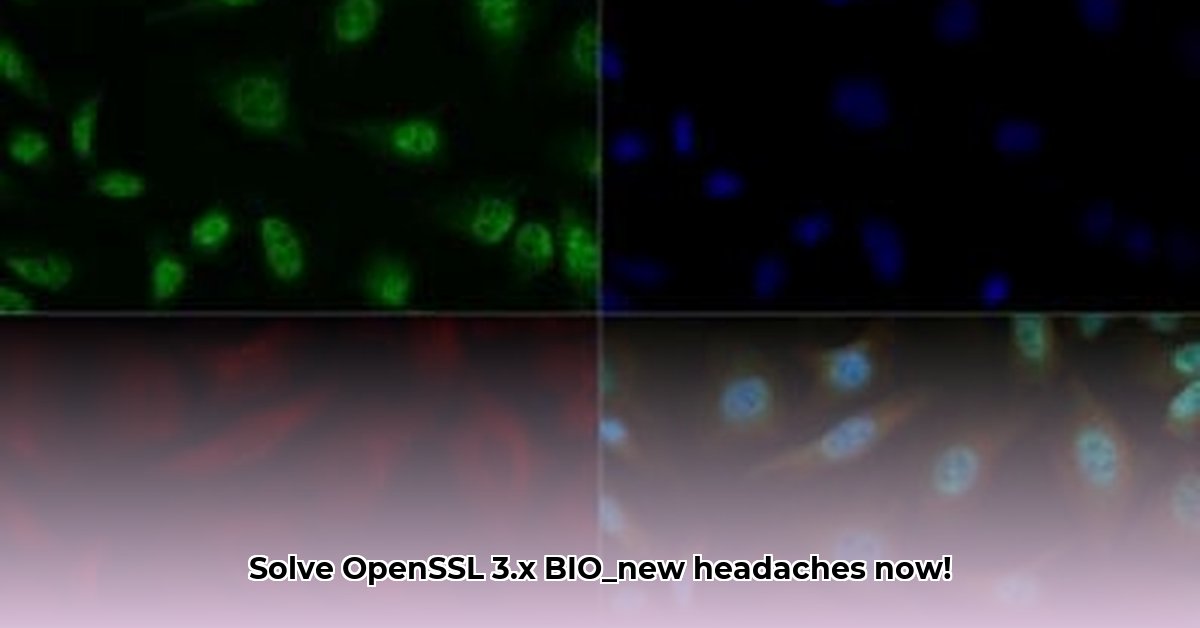
Troubleshooting OpenSSL 3.x BIO_new() Headaches
Upgrading to OpenSSL 3.x often reveals unexpected behavior, particularly with the widely used BIO_new() function. This guide provides a structured approach to troubleshooting silent failures when creating memory-based BIOs using BIO_new(BIO_s_mem()), showing you how to diagnose and resolve common issues, ensuring a smooth transition to OpenSSL 3.x. For further reading on OpenSSL terminology, see this helpful glossary: OpenSSL terminology.
Understanding Silent Failures in BIO_new()
The primary challenge with OpenSSL 3.x BIO_new() errors is their silent nature. The function might return NULL (indicating failure) without providing a clear error message, making debugging significantly more complex than in previous versions (e.g., 1.0.2zg). This lack of informative feedback necessitates a systematic approach to isolate the root cause. Why this happens is multifaceted, and several scenarios need investigation.
A Step-by-Step Debugging Process
Follow these steps to effectively troubleshoot BIO_new() errors:
1. Reproduce the Error: Create a minimal, self-contained program that solely attempts to use BIO_new(BIO_s_mem()). A simple test program helps quickly identify if the issue is within your broader application or a fundamental OpenSSL problem. This isolates the problem, improving diagnostic efficiency.
2. Verify OpenSSL Installation: How was OpenSSL installed? Using a package manager (like apt, yum, or Homebrew) generally ensures correct installation and dependencies. Manual compilation from source increases the risk of configuration errors. Double-check for missing dependencies or incorrect configuration.
3. Resource Monitoring: Insufficient system resources (memory, CPU, disk space) can lead to unexpected errors. Monitor resource usage during execution using system monitoring tools to identify potential resource exhaustion as the root cause.
4. Enable Debugging (If Compiled from Source): If you compiled OpenSSL from source, recompiling with debugging symbols (-g) provides more detailed information when an error occurs. This allows debuggers (like GDB) to provide more context around the failure.
5. Check for Module Conflicts: Older OpenSSL modules might create conflicts in OpenSSL 3.1 and later. Temporarily disable any such modules to see if they're the source of the issue. A methodical approach to eliminating possibilities is valuable.
6. Investigate Memory Corruption: Memory corruption is a less likely but serious cause of seemingly random errors. Tools like Valgrind can help identify memory leaks and other memory-related issues that could lead to the BIO_new() failure. It’s crucial to determine if the problem originates within your application's memory management.
Actionable Intelligence: Practical Solutions
The following table outlines immediate and long-term actions for different stakeholders:
| Stakeholder | Immediate Actions | Long-Term Strategies |
|---|---|---|
| OpenSSL Developers | Improve error reporting to provide more detailed error messages. | Enhance error handling and documentation; implement better diagnostics. |
| OpenSSL Users | Verify OpenSSL version; rebuild with debugging symbols; monitor resources. | Use package managers; update OpenSSL regularly; employ robust testing. |
| System Administrators | Monitor system resource usage; ensure sufficient system resources. | Optimize system performance; allocate adequate resources for OpenSSL. |
Risk Assessment Matrix
Understanding the potential consequences of unresolved BIO_new() errors is crucial:
| Risk Factor | Likelihood | Impact (Severity) | Mitigation Strategy |
|---|---|---|---|
| Memory Corruption | Low | Catastrophic | Employ memory debugging tools; implement robust memory management. |
| Library Conflicts | Medium | Moderate | Employ dependency management tools; regularly update all libraries. |
| OpenSSL Misconfig | Medium | Moderate | Verify OpenSSL configuration thoroughly; re-install if necessary. |
| Resource Exhaustion | Low | Moderate | Monitor system resource usage; optimize application performance. |
Key Takeaway: The transition to OpenSSL 3.x often requires adjustments to how BIOs are handled. Silent errors in BIO_new() are challenging but solvable through systematic debugging and careful attention to memory management. Addressing these issues is essential for maintaining application stability and security. Failing to resolve these could lead to application instability and potential security vulnerabilities. The severity of the impact depends strongly on the context in which BIO_new() is used.